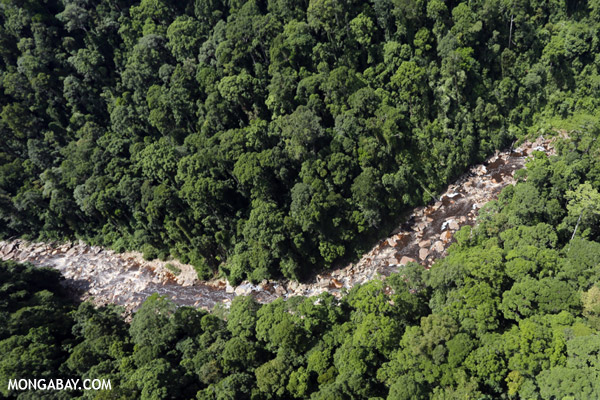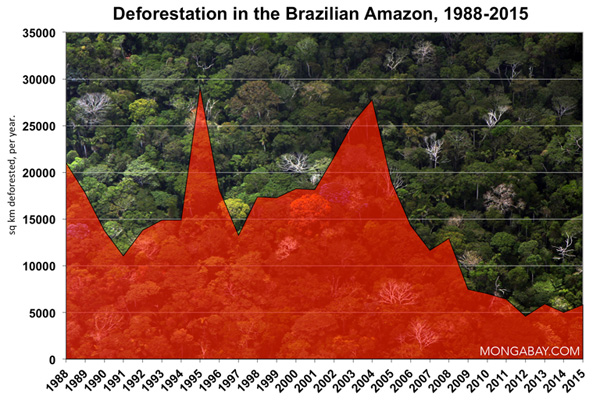
Cleared timber plantation and peat forest in Indonesia. Photos by Rhett A. Butler.
Dozens of companies, non-profit organizations, and governments pledged to work together to halve forest loss by 2020 and end it altogether by 2030. If implemented, the commitment could reduce annual carbon dioxide emissions by 4.5-8.8 billion tons annually, equivalent to removing a billion cars from the world’s roads.
The New York Declaration on Forests, unveiled Tuesday at the U.N. Climate Summit in New York, is the product of months of U.N.-led behind-the-scenes coalition-building between a wide range of stakeholders.
“I asked for countries and companies to bring bold pledges, and here they are,” said UN Secretary-General Ban Ki-moon in a statement. “The New York Declaration aims to reduce more climate pollution each year than the United States emits annually, and it doesn’t stop there. Forests are not only a critical part of the climate solution – the actions agreed today will reduce poverty, enhance food security, improve the rule of law, secure the rights of indigenous peoples and benefit communities around the world.”
The declaration calls for a specific deadline to ending deforestation as well as massive economic incentives for countries to cut forest loss and degradation. It also urges a large-scale forest restoration effort across 350 million hectares that would reduce pressure to convert and selectively harvest old-growth forests for agriculture and timber.

Rainforest in Borneo.
Among the signees are several companies that have recently established zero deforestation policies for commodity sourcing and production, including consumer products giant Unilever and Indonesian forestry giant Asia Pulp & Paper (APP).
“The last few months have seen a welcome race to the top,” said Paul Polman, Chief Executive Officer of Unilever, in a statement. “Consumers have sent companies a clear signal that they do not want their purchasing habits to drive deforestation and companies are responding. Better still, companies are committing to working in partnership with suppliers, governments and NGOs to strengthen forest governance and economic incentives. It can be done and this Declaration signals a real intention to accelerate action.”
“United Nations Secretary-General Ban Ki-moon has done the planet and some of its most critical ecosystems a great service in convening this ground-breaking meeting of governments, global business leaders and NGOs,” added Teguh Ganda Wijaya, Chairman of APP. “Business can take the lead in delivering these commitments, but we must work closely with all stakeholders including governments and NGOs to truly tackle deforestation and climate change. One of the most effective ways to do this is by conserving forest, planting trees, and protecting the natural forest that surrounds.”
The declaration was accompanied by an announcement from Cargill, a company that sells $135 billion worth of crops and agricultural products a year, that it will eliminate deforestation across all of its commodity supply chains.

Rainforest in Riau, Sumatra within a conservation concession managed by APP.
The private sector pledges are important because industrial commodity production — including cattle, palm oil, soy, sugar, and timber — accounts for the bulk of tropical deforestation today. But governments also have a key part to play in arresting forest loss. Accordingly, several governments also announced new initiatives to support the declaration’s goals. Norway said it would offer up to $450 million in performance-based finance to Peru and Liberia for success in cutting deforestation, while Germany and Britain indicated they would join the Nordic nation in pushing for a global forest conservation compensation package at 2015 climate talks in Paris.
Additionally, a coalition of indigenous peoples’ organizations promised to protect 400 million hectares of forests on the lands they manage.
“Forests are not solely economic resources, but are the center of spiritual life and cultural integration for indigenous peoples,” said Abdon Nababan, Secretary General of the Indigenous Peoples Alliance of Indonesia’s Archipelago (AMAN), said in a statement. “The New York Declaration is a long-awaited show of political will by all countries to support indigenous peoples as we fight to defend our forests.”

Estimated emissions reductions under the declaration according to a Climate Advisers report.
Target: massive emissions reductions
With forest loss currently amounting to more than ten million hectares a year, successful implementation of the declaration could have a substantial impact of greenhouse gas emissions. According to one estimate from Climate Advisers, the declaration could cut CO2 emissions by tens of billions of tons by 2030 through avoided deforestation, forest conservation, and forest restoration.
Beyond the climate benefits, maintaining forest cover would pay dividends for biodiversity, other ecosystem services, and forest-dependent peoples.

Clearing of rainforest in Malaysia for oil palm plantations.
Conspicuous absences
But while there the declaration received widespread accolades, there were two conspicuous absences on the congratulatory front.
Greenpeace, which has played a central role in pushing companies to adopt zero deforestation commitments and sourcing safeguards, said it wants to see legally binding commitments.
“We need strong laws to protect forests and people, as well as better enforcement of existing laws,” said Greenpeace International Executive Director Kumi Naidoo. “The New York Declaration is missing ambitious targets and tangible actions. Halting the global loss of natural forests by 2030 and eliminating deforestation from agricultural commodities by 2020 at the latest would mean that years of continued forest clearance still lie ahead of us. While we are celebrating announcements on paper today, forests and forest peoples are facing imminent threats that must be averted if we want the Declaration to become reality.”

The Brazilian Amazon has experienced a sharp decline in annual deforestation since 2004. Nonetheless, nearly 20 percent of the Brazilian Amazon has been cleared since the late 1970s.
The declaration also wasn’t endorsed by the Brazil, the country that has accounted for the bulk of global reduction in deforestation — as well as new protected areas creation — over the past decade. According to the Associated Press, there are differing accounts for Brazil’s lack of participation at the federal level (several Brazil states are involved in the declaration).
“Unfortunately, we were not consulted,” Brazilian Environment Minister Izabella Teixeira told the A.P. “But I think that it’s impossible to think that you can have a global forest initiative without Brazil on board. It doesn’t make sense.”
But Charles McNeill of the U.N. Development Program said Brazil didn’t respond to its requests.
“There was no desire to exclude Brazil,” McNeill was quoted as saying. “They are the most important country in this area. An effort that involves Brazil is much more powerful and impactful than one that doesn’t.”
New York Declaration on Forests Forests are essential to our future. More than 1.6 billion people depend on them for food, water, fuel, medicines, traditional cultures and livelihoods. Forests also support up to 80% of terrestrial biodiversity and play a vital role in safeguarding the climate by naturally sequestering carbon. Yet, each year an average of 13 million hectares of forest disappear, often with devastating impacts on communities and indigenous peoples. The conversion of forests for the production of commodities-such as soy, palm oil, beef and paper-accounts for roughly half of global deforestation. Infrastructure, urban expansion, energy, mining and fuel wood collection also contribute in varying degrees. We share the vision of slowing, halting, and reversing global forest loss while simultaneously enhancing food security for all. Reducing emissions from deforestation and increasing forest restoration will be extremely important in limiting global warming to 2°C. Forests represent one of the largest, most cost-effective climate solutions available today. Action to conserve, sustainably manage and restore forests can contribute to economic growth, poverty alleviation, rule of law, food security, climate resilience and biodiversity conservation. It can help secure respect for the rights of forest dependent indigenous peoples, while promoting their participation and that of local communities in decision-making. With our varying mandates, capabilities, and circumstances, collectively we commit to doing our part to achieve the following outcomes in partnership, including by ensuring that strong, large-scale economic incentives are in place commensurate with the size of the challenge:
Achieving these outcomes could reduce emissions by 4.5-‐8.8 billion tons per year by 2030. By working in partnership, we can achieve these goals and chart a new course toward conserving, restoring, and managing healthy forests for the benefit of all. We invite others to join us in committing to a world where people and forests grow together. |







